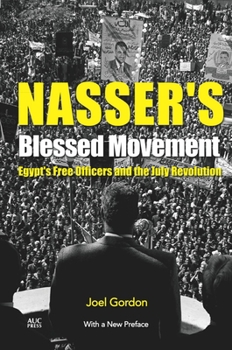Nasser's Blessed Movement: Egypt's Free Officers and the July Revolution with a New Preface
Select Format
Select Condition 
Book Overview
This essential book explores the early years of military rule following the Free Officers' coup of 1952. Enriched by interviews with actors in and observers of the events, Nasser's Blessed Movement shows how the officers' belief in a quick reformation by force was transformed into a vital, long-term process that changed the face of Egypt.
Under Gamal Abdel Nasser, the military regime launched an ambitious program of political, social, and economic reform. Egypt became a leader in Arab and non-aligned politics, as well as a model for political mobilization and national development throughout the Third World. Although Nasser exerted considerable personal influence over the course of events, his rise as a national and regional hero in the mid-1950s was preceded by a period in which he and his colleagues groped for direction, and in which many Egyptians disliked-even feared-them. Joel Gordon analyzes the goals, programs, successes, and failures of the young regime, providing the most comprehensive account of the Egyptian revolution to date.
This edition includes a new Introduction that looks back at the post-1952 period from a post-2011 perspective.
Under Gamal Abdel Nasser, the military regime launched an ambitious program of political, social, and economic reform. Egypt became a leader in Arab and non-aligned politics, as well as a model for political mobilization and national development throughout the Third World. Although Nasser exerted considerable personal influence over the course of events, his rise as a national and regional hero in the mid-1950s was preceded by a period in which he and his colleagues groped for direction, and in which many Egyptians disliked-even feared-them. Joel Gordon analyzes the goals, programs, successes, and failures of the young regime, providing the most comprehensive account of the Egyptian revolution to date.
This edition includes a new Introduction that looks back at the post-1952 period from a post-2011 perspective.
Format:Paperback
Language:English
ISBN:9774167783
ISBN13:9789774167782
Release Date:November 2016
Publisher:American University in Cairo Press
Length:280 Pages
Weight:0.95 lbs.
Dimensions:0.6" x 5.9" x 8.9"
Customer Reviews
1 rating
The perfect example of euphoria with power
Published by Thriftbooks.com User , 18 years ago
I can appreciate the first part of the title: "Nasser blessed movement'. It is to the second part `Egypt's' Free Officers and the July Revolution, that I do not agree. The July 23rd 1952 was not a Revolution per se. The book if full of credible reasons behind what happened in 1952 and this additional note is, perhaps, of added value. The young officers (the majority were in their late twenties and early thirties) started to trickle into army ranks to see how they could secure more votes to have recognizable presence in the Army. The real challenge now was the election of effective members to the Officers Club Board. The young officers activities this time were more energetic because it came in the middle of the hot summer vacation periods when almost all public officials were out of Cairo (some travelled abroad), including the King who was in Alexandria and planned to travel to Europe for the family yearly recreation. King Farouk was suspicious of General Mohamed Najib because he realized how far the General was backed by a group of `garrulous boys' (the King's preferred description of the Free Officers). The young officers were still determined to 1) have, for the first time ever, free elections to the Club, 2) try to push many reforms in the army that were past due after the military poor performance against Israel in 1948 and 3) their presence would be felt during the implementation of any reforms. The King was determined he would never give up to `a bunch of garrulous boys', `the hysterical reckless gang'....... In fact the king hit on a brilliant debating point, he proposed Ali Najib's candidacy. The King's Divan saw this solution in no way conflicted with the King's honour. (General Ali Najib is the borther of General Mohammad Najib). Nevertheless, nothing could have delighted the young officers more than Mohammad Najib's election to the Club, but how could it be achieved. Actually Najib was eloquent that he virtually persuaded key political players to agree to a purely symbolic reforms in the Army beginning with the Officers Club so that the Board would from now on be elected and not appointed by the King as before. It seemed sensible to ask Najib (a General) to represent the Junta (many had been in the ranks of lieutenants) and to mediate with the King on the overdue reforms. In the beginning the Junta never thought of deposing the King, all they were after was to seek reforms including the removal of some 'palace cronies' that they all heartily despised. The Palace men were mainly of certain non-Egyptians of Albanian, French, Italians, and Lebanese/Syrian origins. But all was a frail when they learned King Farouk possessed a complete list of the names of the recalcitrant young officers; Gamal Abdul Nasser's was also mentioned. General Mohamed Najib's name was not there, because to the Egyptian monarch, in specific, and to the monarchy in general, Najib always gave his fidelity and support. And it was only a matter of time to arre





